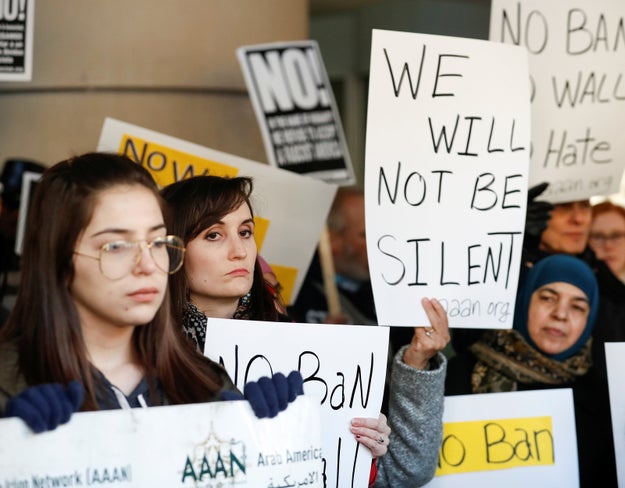[ad_1]

Kamil Krzaczynski / Reuters
WASHINGTON — Nearly a week after a federal district court in Maryland issued a preliminary injunction against the Trump administration's 90-day travel ban for people coming from six majority-Muslim nations, the Justice Department presented a mixed message to the federal appeals court about what it wants next for the case.
The Justice Department told the US Court of Appeals for the Fourth Circuit on Wednesday that it will be asking the court to put on hold the lower court ruling against part of President Trump's second attempt at the travel-related executive order while the government appeals the decision.
In the same filing, though, the department recommends that the court not rule on the department's coming request for at least two weeks.
The Justice Department lays out an unusual request. They're asking for an expedited and full briefing on the merits of the appeal to be done at the same time as the briefing on the forthcoming stay request. The department is asking for that briefing to be completed before the court rules on the stay request.
Typically, the party appealing a ruling asks for a stay pending appeal in advance of the appeal itself — it's a request for the court to put on hold a ruling during the appeals process. By intertwining the stay request with the merits of the appeals process, it's not clear why the court would need to rule on the stay request.
The department filed a notice on appeal on March 17, at which time the appeals court had issued an order setting the default timeline for the case to proceed. That timeline would mean the federal government's opening brief would be due April 26 and briefing wouldn't be completed until early June. The Justice Department on Wednesday asked for that to be sped up, with briefing completed in the case by April 5.
Shortly after the Justice Department filed the request, the Fourth Circuit asked for the plaintiffs in the case to respond to the request by the end of the day.
The filing comes as the Justice Department appears to be interested in moving forward on the Maryland case — brought by nonprofit refugee groups and individuals — even as it has not sought to appeal a more broad order out of Hawaii halting enforcement of both the travel and refugee provisions of the executive order.
After all that, the Justice Department has still not yet filed the actual request for a stay pending appeal at the Fourth Circuit. (By comparison, regarding the first travel ban, the Justice Department filed its request for a stay pending appeal with the appeals court less than 24 hours after the district court issued the order halting enforcement of the executive order.)
Even more confusingly, all of this is happening while the Hawaii order remains in effect. And so long as the temporary restraining order issued by the federal district court in Hawaii remains in effect against both the travel and refugee bans, a stay of the injunction in Maryland would have no effect on whether the Trump administration can enforce the travel ban.
So what kinds of factors could be driving this decision?
Appeals from Hawaii courts go to the US Court of Appeals for the Ninth Circuit, which ruled against the Trump administration's request for a stay pending appeal on the first executive order and has received Trump's disdain in public statements since. The Fourth Circuit — which includes Maryland — has yet to rule on either executive order.
The strategy from the Justice Department appears to be getting a ruling on the merits from the Fourth Circuit — with the hope of a ruling in the administration's favor — before the Ninth Circuit has a reason to rule on the new executive order.
Even if the Justice Department does succeed at the Fourth Circuit, the administration still wouldn’t be able to enforce the new executive order. But if it did, that could change the public dynamics and also could set up a legal conflict with the Ninth Circuit as the Hawaii case proceeds to a preliminary injunction and appeal. That could make it more likely that the Supreme Court would take up and resolve this issue.
More importantly, under that scenario, the timeline could be such that a ninth justice — the confirmation hearing for Trump’s Supreme Court nominee, Judge Neil Gorsuch, is expected to end on Thursday — would be on the bench by time the case reaches it.
[ad_2]
